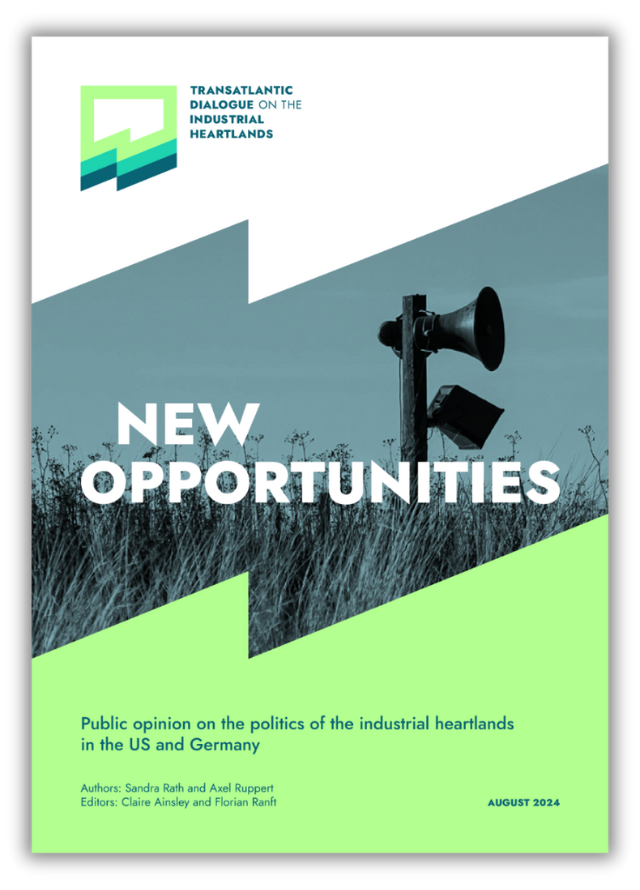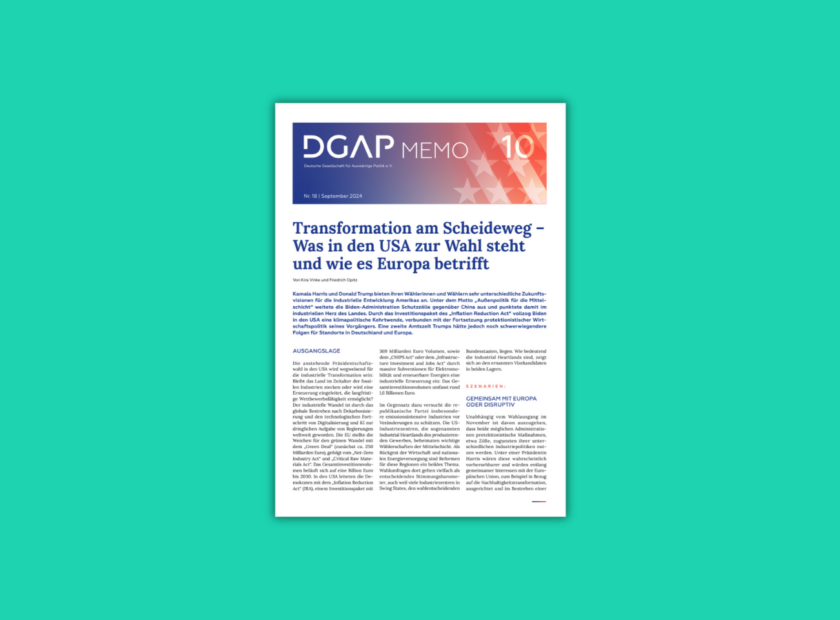The industrial heartlands have become central to the political and policy future of advanced economies. There is a political battle over who can speak for the communities of the industrial heartlands; and who can offer a new prosperity for areas that have been marked by the social, economic and cultural effects of deindustrialisation. Russia’s war of aggression in Ukraine, rising prices for energy and housing and general inflation have triggered material uncertainties, alongside challenges over immigration, integration and trade with China, and the need for action on climate change.
Many centre-left parties have seen their historic link with the communities of the industrial heartlands weaken, particularly in the aftermath of the global financial crisis, which deepened longer-term political and economic trends. This was also demonstrated by the last European parliamentary elections, which showed a rise in support for the populist right in Germany. Also, in the three upcoming regional elections in East German states this September, the right-wing populist Alternative for Germany (AfD) is projected to win one third of the votes. Meanwhile, in the United States, it is not yet certain that the Democrats will be able to retain the presidency in November from challenger Donald Trump.
In recent years, one political response in both the US and Germany has been to support industrial heartland regions with targeted government measures intended to strengthen economic development; to promote clean energy sources and manufacturing jobs; and to strengthen democracy by making sure that people do not feel disregarded and disconnected from the national capitals. The Biden administration has undertaken a paradigm shift in economic policymaking, also known as “Bidenomics”. At its core are three pieces of legislation, the Inflation Reduction Act (IRA), the Creating Helpful Incentives to Produce Semiconductors (CHIPS) and Science Act and the Infrastructure Investment and Jobs Act (IIJA), also known the Bipartisan Infrastructure Law (BIL), which stand for readjustment of the role of the state in driving economic change in the US, including a much bolder geoeconomic, worker-centric and climate-protectionist approach to industrial policy. In Europe, the German Joint Federal/Länder Task for the Improvement of Regional Economic Structures and the EU’s Green Industrial Plan follow a similar approach. However, while the Biden administration’s programme has proven successful in the headline performance of the US economy, it is not yet translating into support for the incumbent government.
Our new survey in the US and Germany provides insights into how people in both countries feel in this age of insecurity and how they view their government’s responses, with a focus on industrial policy. Do these measures have support in the wider population? Is the economic outlook changing for the better? And what is the potential for stronger democratic participation and for countering right-wing populism?
Seven Key Findings
- Economic concerns must be addresses while Tackling climate change
- The time for large-scale investments is now – and they should focus on the industrial heartlands
- Democratic representation is a key factor in fostering trust and accountability
- Policymakers can build on strong support for close transatlantic ties to strengthen our countries’ futures
- Long-Term investments in education, science and innovation are seen as priorities by respondents
- There is strong support for a reform of the debt brake in Germany
- US Voters are divided on the merits of Bidenomics on party lines
Methodology
Our representative national survey was conducted by Ipsos in February and March 2024, surveying 1,500 residents in the US and Germany. The online interviews covered ten questions and the sample included respondents from both the industrial heartlands and other regions in the US and Germany.
Left-behind regions, better called industrial heartlands, are regions within Europe and North America that were once powerhouses for Western economic development as a result of prospering industries, such as coal mining, oil extraction, refineries and natural gas use, or energy-intensive industries such as steel and cement production, and have experienced a relative decline in economic status and loss of employment in manufacturing industries in recent decades.
The results of this survey were first presented and discussed at the Progressive Governance Summit in June 2024 and reveal a clear message for policymakers in both countries. Respondents in both countries support government action in the face of the multidimensional challenges of our societies, but they consider their material economic concerns to be paramount.
https://doi.org/10.5281/zenodo.13384276
About the Authors

Sandra Rath is project manager in the “Green New Deal” Team of Das Progressive Zentrum and works primarily on international projects. Her interests span from US domestic and foreign politics and the transatlantic relationship to the role of the international order in the socio-economic transformation, especially from the feminist perspective. In her previous position as Junior Event Manger, Sandra was responsible for organizing our smaller events as well as large-scale conferences and our Progressive Summer Party together with the Events Team. From 2022-2023, she taught a seminar called “An Introduction to Transatlantic Relations” at TU Dresden. Sandra holds a Bachelor’s degree in American Studies from the University of Leipzig and Master’s degree in International Relations from Dresden University of Technology as well as Sciences Po Rennes (France).

Axel Ruppert is project manager overseeing international projects on socio-ecological transformation in the focus areas “Green New Deal” and “Resilient Democracy” of Das Progressive Zentrum. Previously, Axel worked in Brussels at the office of the Rosa Luxemburg Foundation and at the European Network of Equality Bodies (EQUINET) and European Network Against Racism (ENAR). He holds a Bachelor of Arts in Political Science from Marburg University and a Master of Arts in European Studies from Aarhus University.





